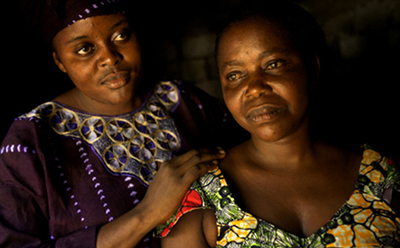“Fistula has virtually been eliminated in most high and middle income countries around the world, so we know that it can be eliminated in every country.”
Secretary-General Ban Ki-moon

Odette Kusiku Mbaku Maswaku (right) received a fistula repair surgery at a
UNFPA-supported hospital in the Democratic Republic of the Congo.
Photo: Robin Hammond/Panos
Obstetric fistula is one of the most serious and tragic injuries that can occur during childbirth. It is a hole between the birth canal and the bladder or rectum caused by prolonged, obstructed labour without treatment.
The condition typically leaves women incontinent, and as a result they are often shunned by their communities. Sufferers often endure depression, social isolation and deepening poverty. Many women live with the condition for years – or even decades – because they cannot afford to obtain treatment.
An estimated 2 million women in sub-Saharan Africa, Asia, the Arab region, and Latin America and the Caribbean are living with this injury, and some 50,000 to 100,000 new cases develop each year. Yet fistula is almost entirely preventable. Its persistence is a sign that health systems are failing to meet women’s essential needs.
In its resolution A/RES/67/147, the General Assembly calls on the international community to use the International Day to significantly raise awareness and intensify actions towards ending obstetric fistula.

